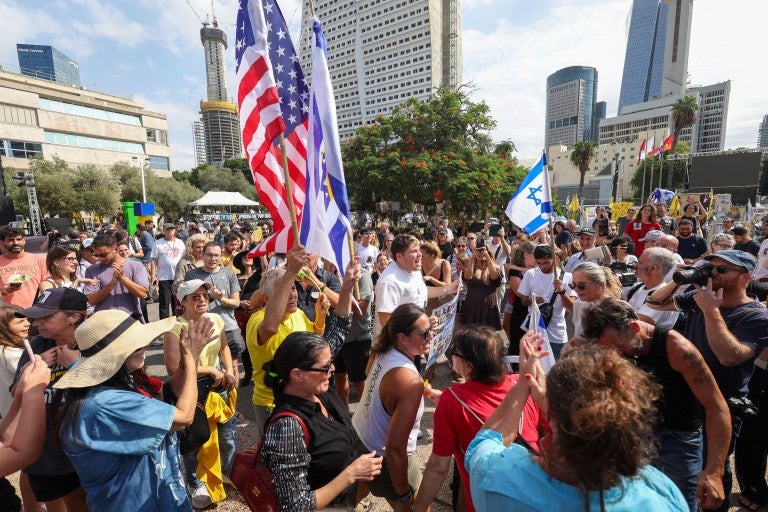July 14, 2025
This piece originally appeared in the Florida Jewish Journal.
By Debbie Koristz, AJC Palm Beach Associate Director of Advocacy and Programming
Life in Israel swings from one extreme to the next. One moment, you’re dancing in Jerusalem’s Mahane Yehuda market on an ordinary Thursday night; the next, your phone blares urgent alerts from Israel’s Home Front Command: find shelter—incoming missiles.
After 77 years of fighting for its existence, Israelis live with an unspoken rule: live fully today, because tomorrow is never guaranteed. I know this well. I lived in Israel for ten years. But nothing prepared me for twelve straight days of missile strikes from the Iranian regime.
It was a typical Thursday night in Israel—the start of the weekend, the streets alive. My husband and I were returning from friends, our teenage daughter from a night out with her cousin. A week into our ten-day visit, our phones suddenly blared with missile alerts. Israel had struck Iran’s nuclear sites. Retaliation was coming. In an instant, our family vacation became the kind of Israel experience I’d never imagined.
The first nights—jerked awake by sirens, rushing to the safe room, hearing distant booms—were terrifying. Anyone who says otherwise is likely lying. But as the days passed, we found a strange rhythm: missile strikes by night, small moments of normalcy by day—errands, delicious Israeli breakfasts at a local cafe, meeting up with family.
My teenagers coped their way—sleeping late, scrolling phones, binge-watching trashy reality shows. Parenting rules vanished. The war dictated everything—from when we ate to when we showered. No one wanted to be mid-shampoo when the next siren hit.
It was reminiscent of the early days of COVID—trying to create order in chaos. One night, the explosions overhead were so loud, it felt like a WWII Blitz scene. Except this was 2025, and instead of blackout curtains and radios, we were in a safe room, scrolling our phones, pretending this was normal.
When Israeli airspace closed and our return flight to Florida was canceled, we found ourselves stranded with thousands of others. Options to leave were limited—and risky. As dual American-Israeli citizens with two kids, crossing the Egyptian or Jordanian border amid level-four terror threats felt reckless.
We juggled sleepless nights and rising anxiety, reminding ourselves we were lucky. Jerusalem was safer than much of the country. Some of our relatives were in areas hit far harder, with civilian casualties. And we had a private safe room—not a shared bomb shelter, where people in pajamas run downstairs with their neighbors.
Days later, we got word: we were joining an evacuation group. The next morning, more than 100 of us gathered in a Jerusalem park, waiting for buses to take us across the Jordanian border. Then the sirens blared.
There was no shelter—just open space. We had ten minutes. We ducked beneath a half-covered canopy—stone beams and branches overhead—as missiles tore through the sky. Explosions echoed in the distance. Alerts buzzed nonstop. We should have expected this; the U.S. had bombed Iranian sites the night before. For the first time, I truly feared for our lives.
Until then, we’d rationalized our safety. Jerusalem is sacred to three major religions, we told ourselves—surely no one would target it. But that illusion shattered. I clutched my children and prayed—really prayed—shaking, heart racing, forcing back tears so they wouldn’t see my fear.
After twenty agonizing minutes of missiles, the all-clear sounded. People emerged from cover, and the buses rolled in.
That missile barrage marked the beginning of our grueling three-day evacuation—through Jordan, Cyprus, and then finally home to Florida. We traveled with 350 others, bound not just by logistics, but shared trauma. As an Israeli, evacuation felt unthinkable. Israel is home as much as Florida. But we’re deeply grateful to the State of Florida and the heroic Grey Bull team who got us home safely.
Back home, the contrast was surreal. No sirens. No safe rooms. Just grocery store aisles, camp drop-offs, morning meetings, and a nervous system still on high alert. It takes time to flush out adrenaline. To stop jumping at loud noises.
A friend in Israel later told me, “I’m sorry you were here for the war.” But I’m not.
While I never wanted my children to experience that kind of fear, I’m deeply proud of how they handled it. Their connection to Israel—and to their Jewish identity—deepened in ways I could never have predicted. They understand, in their core, the courage and resilience that define our people. Israel is a thread woven into who they are— never hesitating when asked if they’d go back.
As someone in our evacuation group said: “It’s in moments like these when Israelis shine as a people.”
My children now carry that experience not as a burden, but as part of them—woven with belonging, strength, and a profound connection to the enduring spirit of the Jewish people.





